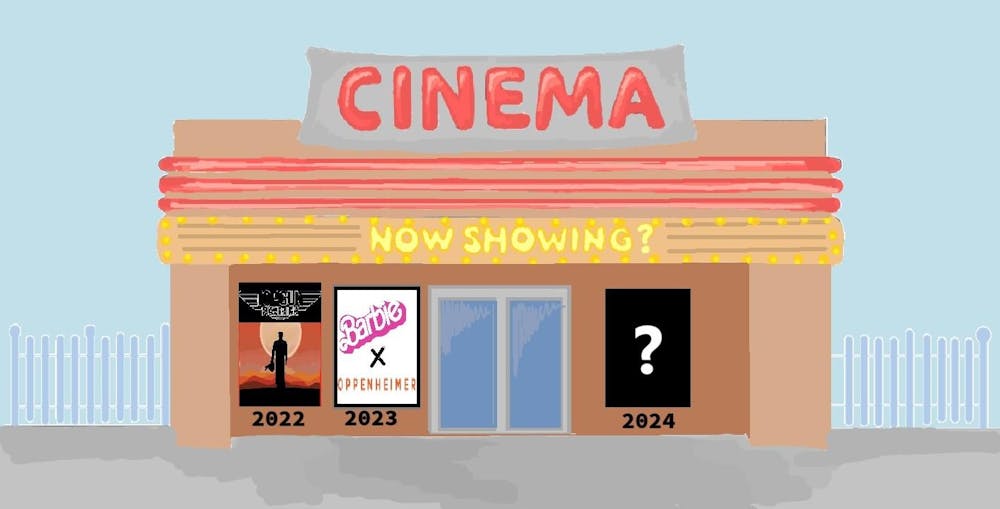The arrival of Labor Day weekend has officially brought the summer 2024 box office to a close, which was kicked off back in May with the release of “The Fall Guy.” This year has had its ups and downs cinematically, but overall can be deemed a success, with a cumulative domestic gross of $3.6 billion that falls roughly half a billion short of last summer’s $4.09 billion, a solid number for an industry still reeling from the effects of last year’s WGA and SAG-AFTRA strikes.
Particularly notable to these figures are the identities of the industry’s money makers. Of the 13 movies that grossed over $100 million at the domestic box office last year, there was only one original story — “Elemental.” Same is true of this year so far — of the nine movies that have crossed the $100 million mark, only one is an original.
Indeed, going back even a decade, almost all of the highest grossing films are consistent in their identities as parts of larger wholes. These are sequels and prequels, reboots and reimaginings of stories and substance with which modern culture is already familiar, if not overwhelmed. According to Media Studies Professor Sean Duncan, this reliance on pre- existing intellectual property has a lot to do with Hollywood’s perception of their audience.
“It's about the raw economics of this industry,” Duncan said. “If you're already aware of what a Barbie doll is, you're going to be more inclined to go see a ‘Barbie’ movie. If you're already aware of ‘Top Gun,’ because you've seen the first ‘Top Gun’ movie on cable a bunch of times as a kid, then you're primed to be aware of what the franchise is about.”
He also said that the continued relevance and reproduction of these forms of franchise entertainment can be attributed in large part to the bounty of streaming services which provide easy access to entertainment.
“It's more desperate, in some ways, for Hollywood to make sure that, if they want to get people in seats, they're giving them something that is recognizable,” Duncan said.
Even more interesting than the concept of movies as capital is that of movies as cultural capital. Summer 2023, of course, is notable in its record-breaking, revolutionary nature — the dual release of Greta Gerwig’s “Barbie” and Christopher Nolan’s “Oppenheimer,” and the subsequent Barbenheimer sensation that swept the globe to define not only cinematic but cultural conversation.
“Barbenheimer is very difficult to replicate,” noted Duncan, “because in many ways, Barbenheimer is an accidental happenstance. These are two movies by two completely different studios, two different kinds of auteurist directors who’ve got their own fan bases, that happened to be released on the same day. So there is a virality to this that really buoyed it ... and turned it into a very singular kind of thing.”
It is this singularity that this summer’s box office was lacking. Despite several acclaimed releases —- most notably “Twisters,” which felt like a return to a very traditional and refreshing mold of classic summer blockbuster — there was nothing that carried the same weight within the culture. There was no global sensation, no summer defining phenomenon. No one dressed up in all pink to go to the movie theater, although some did sport yellow for “Despicable Me 4.” There was no Barbenheimer.
Yes, Barbenheimer was unique, but it was unique because of the time at which it fell, a time for culture when movies are no longer at the epicenter of it. Prestige television has taken over the spaces that original stories used to occupy – take “Presumed Innocent” and “Ripley,” two 2024 television series whose source materials include not only iconic novels but also iconic 1990s films.
This trend of adaptation speaks to a larger movement away from film as the predominant medium, part of what makes the Barbenheimer phenomenon so noteworthy — yes, movies are something, but for a moment last summer it felt like they were everything, everywhere, all at once.
Perhaps this shift away from cinematic centrality is a reflection of the aforementioned trend of sequels and episodic storytelling. Or perhaps it can be attributed to a shift towards direct-to-streaming releases, with productions such as Doug Liman’s “The Instigators” and Richard Linklater’s “Hit Man” only seeing limited theatrical releases before arriving to streaming services.
Certainly the public’s relationship with film has evolved in the time between 1996’s “Twister” and 2024’s “Twisters,” but Jack Hamilton, Associate professor of Media Studies and American Studies, feels this change, while relevant, is not necessarily all-encompassing.
“Movies’ position in the culture has changed a lot, certainly from the 90s,” said Hamilton. "I do think that movies have lost some of their centrality, because of what streaming has done, and just generally because of people's consumption habits, but I think they still can have that type of resonance.”
Hamilton cited Christopher Nolan’s “Oppenheimer” and Will Gluck’s “Anyone But You,” two 2023 releases that both massively exceeded box office expectations — “Oppenheimer” grossed almost a billion dollars globally and “Anyone But You” over $200 million.
The latter production also carries with it an interesting cultural commentary, as its success was fueled in part by rumors circulating its production of an affair — or at least incredible chemistry — between its two stars, Glen Powell and Sydney Sweeney. This sort of drama is a tale as old as time, but, as Hamilton noted, it is also integral to movies’ ever-fluctuating relationship with culture.
“It's been going on for as long as Hollywood's been around, you know, like these, like gossip, rumors about stars, about people being difficult,” Hamilton said. “Sometimes troubled productions will draw a lot of attention.” This in turn serves to do what studios want most — get audiences into movie theaters, and bring, if not acclaim, then at least awareness to productions.
This was certainly the case for “It Ends with Us,” one of this summer’s top hits and a film that has been a hot topic of conversation recently due to an alleged feud between its two costars. Amidst creative differences and tonal miscalculations, the messiness of this production caught the eye of social media and its difficulties were broadcast to virality.
But perhaps this controversy, and its subsequent unlikely box office success speaks to a way in which the film industry has evolved — the means of spreading information may be different, but the desire for drama is the same as it was 20 years ago.
And just as the age-old sort of production gossip has evolved to meet present times, so, too, have the very concept upon which modern cinematic culture feels so reliant — that of episodic storytelling. Franchise entertainment has been with us for generations, but what is more new, Duncan noted, is the idea of interconnected universes, wherein independent works come together and contribute to a larger, joint storyline.
“The idea of building things off of different kinds of intellectual property has gone back for a very, very long time,” Duncan said. "What's new and different about it [now], I would argue, and have argued in my classes, is the emphasis on shared universes the last couple of years … You had a Captain America franchise, a Thor franchise, an Iron Man franchise, that all intersected and turned into ‘The Avengers,’ and now it's gone on for so long, for 30 some movies. There's certainly fatigue.”
Whether or not modern culture is tired of these interconnected stories, it doesn’t look like they will be leaving anytime soon, as the slate for next summer’s box office is already overflowing with new iterations. “Avatar: Fire and Ash,” “Captain America: Brave New World,” “Mission: Impossible – Dead Reckoning, Part Two,” “Superman: Legacy,” — the cycle of colon-separated, Intellectual Property-enhancing productions is seemingly endless.
While the question of what society has come to expect from the film industry — or should expect from it — remains open to debate, the summer 2024 box office is certainly an indication, if not of what culture wants, then at least of what studios and movie theaters want to remain pertinent to and present within it. And regardless of personal opinions on superheroes or Patreon memberships on Letterboxd, it feels like the rebuilt worlds and remade films are here to stay.







